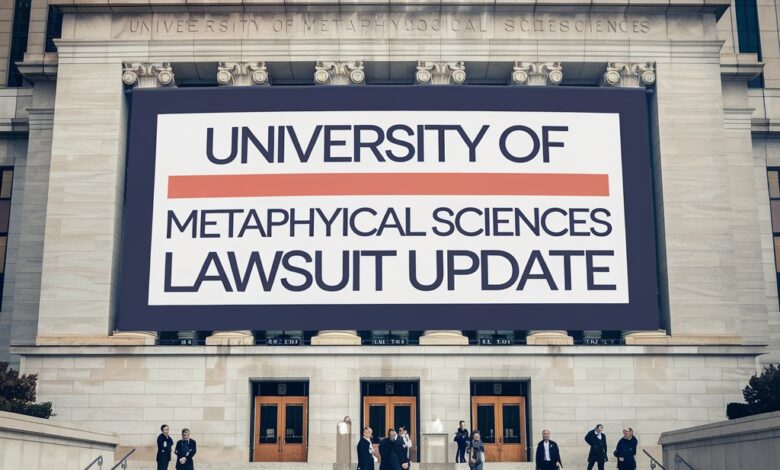Introduction
The University of Metaphysical Sciences (UMS) has been a prominent institution for metaphysical education, fostering spiritual growth and self-awareness through diverse programs. However, the university recently became the subject of a lawsuit that has garnered widespread attention. This legal battle raises critical questions about the institution’s practices, impacting its students, alumni, and broader metaphysical education landscape. This article delves deeply into the lawsuit’s background, current status, potential outcomes, and implications.
Background of the University of Metaphysical Sciences
History and Mission of UMS
Founded to make metaphysical education accessible to all, the University of Metaphysical Sciences has long been a hub for spiritual exploration. Its mission emphasizes enlightenment, wisdom, and self-discovery through structured courses and degrees in metaphysics, spirituality, and holistic practices. The university caters to students seeking personal growth, professional development in holistic fields, or both.
Educational Offerings and Programs
UMS offers many programs, including certificates, bachelor’s, master’s, and doctorate degrees. These programs cover meditation, energy healing, metaphysical counseling, and spiritual philosophy. With an emphasis on flexible, online learning, UMS has attracted a global student body. The institution’s promise of a transformative educational journey has made it a popular choice among spiritual seekers.
The Lawsuit at a Glance
What Led to the Lawsuit?
The lawsuit against UMS centers on allegations regarding the institution’s accreditation, student grievances, and financial practices. Plaintiffs have accused the university of misleading claims about its credentials and the legitimacy of its programs. Additional complaints involve tuition refunds and dissatisfaction with the quality of education provided.
Key Parties Involved
The legal battle involves former students, regulatory bodies, and the university itself. The plaintiffs, comprising disillusioned students and advocacy groups, seek accountability and restitution. On the other side, UMS is defending its practices and reputation.
Allegations Against the University
Summary of the Claims Made
The plaintiffs allege that UMS misrepresented its accreditation status, leading students to believe they were enrolling in a fully accredited institution. This misrepresentation, they argue, has devalued their degrees and limited their professional opportunities. Other claims include poor program quality and inadequate student support. Complaints about delayed or denied tuition refunds have also surfaced.
Impact of the Allegations on UMS’s Reputation
The allegations have cast a shadow over UMS’s reputation. Critics question the university’s credibility and operational ethics, while prospective students express concerns about the value of enrolling in its programs. The lawsuit has also fueled skepticism about metaphysical education providers more broadly.
Defense by UMS
The University’s Response to the Allegations
UMS has firmly denied the allegations, asserting its commitment to transparency, quality education, and student support. The university contends that its programs are designed to meet the needs of students pursuing metaphysical and spiritual studies and that any misunderstandings about accreditation were unintentional.
Legal Strategies Adopted
UMS’s legal team has focused on disproving the claims of misrepresentation and demonstrating the institution’s compliance with relevant laws. The defense has also highlighted UMS’s proactive efforts to address student complaints and improve its services.
Current Status of the Lawsuit
Timeline of Recent Developments
The lawsuit has seen several key developments. Initial filings outlined the plaintiffs’ grievances, prompting UMS to respond with counterarguments. Court hearings have involved the presentation of evidence and testimonies from both sides. While no final verdict has been reached, the case remains active, with mediation attempts and further proceedings expected.
Statements from Both Sides
UMS’s statements emphasize its dedication to resolving issues and maintaining its mission of spiritual education. The plaintiffs, however, maintain that they were misled and demand accountability. Both sides’ contrasting narratives have kept the case in the public eye.
Potential Outcomes and Implications
Possible Verdict Scenarios
The lawsuit could lead to several possible outcomes:
- Dismissal: If the court finds insufficient evidence to support the plaintiffs’ claims, the case could be dismissed.
- Settlement: Both parties might agree to an out-of-court settlement, which could involve compensation for affected students and policy changes at UMS.
- Court Ruling for the Plaintiffs: A ruling in favor of the plaintiffs could result in financial penalties for UMS and mandates for operational reforms.
- Court Ruling for UMS: A verdict favoring UMS would reinforce its credibility and absolve it of wrongdoing.
Long-Term Effects on UMS and Its Stakeholders
The outcome will significantly impact UMS’s operations, reputation, and financial stability. A favorable verdict could help the university rebuild trust, while an adverse ruling may necessitate substantial changes in its policies and practices. Students and alumni are also likely to feel the ripple effects of the case.
Impact on Students and Alumni
How the Lawsuit Affects Current Students
Current students have expressed concerns about the lawsuit’s implications for their education and degrees. Questions about program continuity and the value of their qualifications have led many to seek assurances from the university.
Concerns of Alumni and Their Support for UMS
Alumni reactions vary widely. While some remain supportive of UMS and its mission, others worry that their degrees may lose credibility. Alumni networks have become forums for discussing the case and its potential impact on their professional prospects.
Public Perception and Media Coverage
How the Media Has Portrayed the Lawsuit
Media coverage of the lawsuit has been extensive, with some outlets adopting a critical tone toward UMS. Reports often highlight the broader implications of the case for metaphysical education and consumer protection in higher education.
Public Reactions and Support for Both Sides
Public opinion is divided. Supporters of UMS emphasize its positive impact on their lives and spiritual growth, while critics call for greater accountability and transparency. Online discussions and social media platforms have amplified these contrasting viewpoints.
Lessons Learned from the Case
Broader Implications for Other Metaphysical Education Providers
The lawsuit serves as a cautionary tale for other metaphysical education institutions. Transparency in accreditation claims, clear communication of program details, and robust grievance mechanisms are essential to maintaining trust and credibility.
Importance of Transparency and Compliance
Educational providers must prioritize compliance with legal and ethical standards. Accurate accreditation information, responsive student support, and fair financial practices are non-negotiable for building lasting credibility.
UMS’s Plans for the Future
Efforts to Rebuild Trust and Credibility
UMS has begun implementing measures to address concerns raised by the lawsuit. These include reviewing and updating policies, enhancing student support services, and increasing transparency in communication.
Potential Reforms in Policies
Proposed reforms at UMS focus on improving clarity around accreditation, streamlining tuition refund processes, and strengthening grievance resolution mechanisms. These changes aim to restore confidence among students and stakeholders.
Conclusion
The lawsuit against the University of Metaphysical Sciences underscores the challenges facing institutions in the metaphysical education sector. While the legal proceedings are ongoing, the case highlights the importance of transparency, accountability, and trust in higher education. As UMS navigates this turbulent period, the lessons learned will shape not only its future but also the broader landscape of metaphysical studies.
FAQs
- What is the University of Metaphysical Sciences? The University of Metaphysical Sciences is an institution offering spiritual and metaphysical education through online and on-campus programs, with degrees ranging from certificates to doctorates.
- Why was the University of Metaphysical Sciences sued? The lawsuit involves allegations of misrepresented accreditation, student grievances, and financial practices.
- What is the current status of the lawsuit? The lawsuit is ongoing, with both parties presenting evidence and arguments. Mediation attempts and further court proceedings are expected.
- How does this lawsuit affect students and alumni? Current students are concerned about program continuity, while alumni worry about the credibility of their degrees. The outcome will have significant implications for both groups.
- What lessons can other institutions learn from this case? The case emphasizes the need for transparency, compliance with regulations, and effective grievance resolution to maintain trust and credibility in the education sector.
Read also: baddiehubnews





